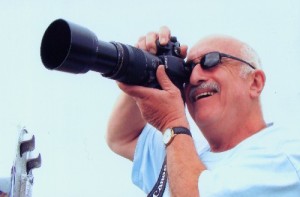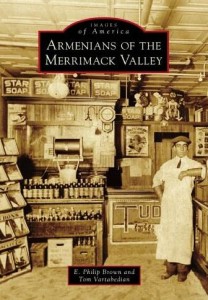Special for the Armenian Weekly
Tom Vartabedian considers his latest project his legacy piece. As a passionate voice of the Armenian community of Merrimack Valley, Vartabedian’s recently released book showcasing the community he so dearly cherishes is also one that he hopes his children and community will be most proud of, as he faces the fight of a lifetime.
Vartabedian’s name is no stranger to the pages of the Armenian Weekly—he has volunteered his services as a columnist and correspondent with the paper for nearly a half century. His countless articles have appeared in several Armenian and non-Armenian publications over the years, covering everything from community events and initiatives, to interesting individuals and their stories from both Armenia and the Armenian Diaspora. Many readers look forward to his weekly “Poor Tom’s Almanac” column in particular, which has been published for more than 45 consecutive years, since 1970.
Vartabedian’s latest endeavor began about a year ago. “A friend of mine, Philip Brown, teaches world history at Haverhill High School, and I’ve been going into his classes for years to speak to students about the Armenian Genocide. It’s one of many schools I’ve been visiting in the area,” he said. Brown was so inspired by the resilience of the Armenian people—their long legacy and history—that he decided to put a book together about the Armenians of Merrimack Valley. Considering Vartabedian’s vast knowledge of Armenian history—particularly the history of the Armenians of the United States—Brown decided to ask Vartabedian to help him out.
Vartabedian has been a faithful community leader and activist for the past 50 years. A devoted member of the Armenian Revolutionary Federation (ARF), an Armenian Youth Federation (AYF) advisor for three decades, a staunch activist in raising genocide awareness, a Board member of Project SAVE Archives—these are just a few of the ways Vartabedian is known in his beloved Armenian community.
“I had a wealth of knowledge, a wealth of history of over 50 years stored in my computer—a very rich repository of information about the Armenian community. So I agreed to help Phil out,” Vartabedian said.
‘We’re Not Extinct, We’re Distinct.’
Vartabedian got so involved in the project, that he quickly became the co-author. “I did all the editorial work in it—eight chapters in all.” The book’s introduction, preface, and the back pages are also all based on Vartabedian’s knowledge of Armenian-American history.
The final product is Armenians of the Merrimack Valley, part of the “Images of America” series published by Arcadia Publishing. The book—which boasts 170 historic photographs over 128 pages—tells the story of Armenian life in the area from early immigration prior to and during the Armenian Genocide, to the thriving community today.
“Our target audience is not just the Armenians, but the non-Armenians out there—so that they can see who we are, what we are, what we represent,” said Vartabedian, who hopes that his newest project will help fill a significant void. “There is very little written about our history in schoolbooks. You’d be surprised. We’re an asterisk in World War II, for example. Ours is a story that needs to be told.”
The book showcases generations of Armenians in Merrimack Valley going back to when they first immigrated to the United States. “I have four generation of Armenians covered in the book. I look for the human interest element in all these pictures and stories,” Vartabedian said.
Since its Feb. 8 release, copies of Armenians of Merrimack Valley have been selling well—so well, in fact, that a second printing is already being planned. “We had 1,400 copies printed and we’re just about sold out, so we’re going to do a second printing. There’s big demand for it,” said Vartabedian. “Many libraries that have book-of-the-month clubs have invited us to present the book as well.”
The photographs in the book are paired with descriptions. “A lot of the story is told through these photographs,” said Vartabedian, who decided it would be fitting to dedicate the book to the victims and survivors of the Armenian Genocide. Vartabedian regrets that his mother, the last genocide survivor in Haverhill, passed away before the completion of the project. “She’s probably reading it in heaven,” he mused.
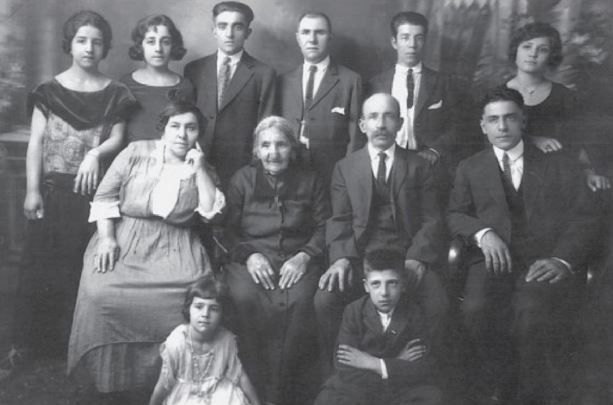
The Baboian family of Haverhill, Mass., photographed around 1924 (Photo courtesy of Rayissian family/Tom Vartabedian)
His hope is that readers will learn that despite the genocide, Armenians not only exist, but continue to thrive. “Although we lost half our nation in 1915, we’re larger and more productive now than we’ve ever been. Wherever you go, you’ll find an Armenian—whether in the classroom, the bar association, the music industry, athletics, the military, wherever—there are Armenians everywhere and they’re making quite a name for themselves. That to me is the basis of this book.”
“Honestly, when you start to think about it and you see all our accomplishments in world history over the past 3,000 years, it’s absolutely remarkable. I’d like to think that people don’t look to us as an extinct race; they look to us as a distinct race,” he said. “We’re not extinct, we’re distinct,” he repeated with a tone of defiance.
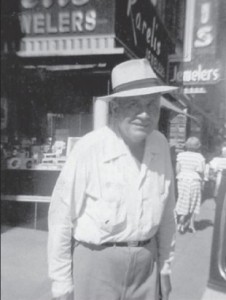
War veteran Bagdasar Choolian was born in Chunkush in 1888. He immigrated to Haverhill in 1910 with his wife Shooshan, and died in Essex, Mass. in 1966. (Photo courtesy of Diane McIntosh)
Now retired from his local Haverhill Gazette, where he spent 40 years winning countless awards from AP and UPI in New England as a writer and photographer, Vartabedian has more time to focus on what is perhaps his biggest passion: the Armenian community. “We’re trying to mobilize the youth as much as possible. We’re passing the torch. We’re teaching our kids in our Armenian schools. We’re sending them to Hayastan, so they are acquainted with the homeland: They’re building homes, making connections, seeing the country. We’re making them proud Armenians,” he said.
Vartabedian has been teaching at the Merrimack Valley St. Gregory Armenian Apostolic Church Armenian School for the past 45 years. He has also served as the superintendent of the church’s Sunday School for some 30 years. Today, he teaches the children of the parents he taught back in the 1970’s and 1980’s.
“Today’s kids are so busy that the language and the culture often takes a back seat; they are becoming Americanized very quickly. They’re living in a very homogeneous society,” Vartabedian explained. “Years ago, they didn’t have as many things going for them. So the time that they are in church, that they are in Armenian school, we try to get them engaged. I speak to them, I show them this book—in which many of my students have a place—and you can’t imagine the pride that is reflected in their faces. To me, that’s worth anything more than you can buy.”
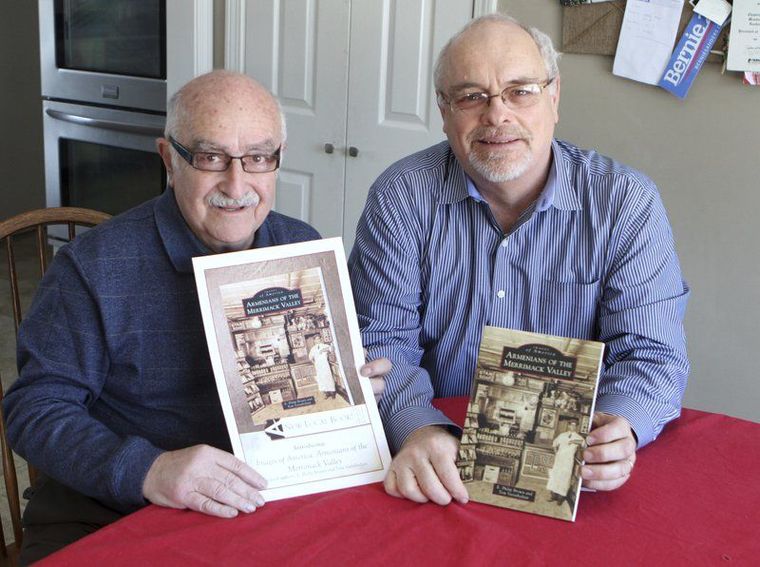
Tom Vartabedian, left, and Haverhill High teacher E. Philip Brown show off the book they co-produced on Armenians in the Merrimack Valley. (Photo: Amy Sweeney/Haverhill Gazette Staff)
A Battle of a Lifetime Persevered through Faith
Vartabedian values two things above everything else: family and faith. “You can take it any which way you want. Without our church, we’re nothing; without our families, we’re even less,” said Vartabedian, who is self-admittedly very much a man of faith.
And that faith is what has been instrumental in helping him overcome his latest challenge—one of the biggest he has faced.
Vartabedian was recently diagnosed with liver cancer. And though the disease was detected before it could spread to other parts of his body, he is unsure about what the future holds for him.
“I don’t know what the outcome is going to be, but hopefully God will be with me,” he said. Vartabedian plans on keeping readers updated on his battle with cancer, and hopes to inspire others along the way. “I don’t know how else to do it. I’m a writer; why not share the bad with the good?”
“I’m trying to be strong for everybody. I go to church; about a month ago I joined the church choir. I knew what my situation was, so I figured if I’m good to God, he may be good to me,” he said.
An excerpt from the introduction to Vartabedian’s legacy book goes: “Armenians have taken initiative against uncalculating odds and made the most of opportunity. Like a phoenix rising from the ashes, the Armenians kept their resilience intact through difficult times. And they have done it with the intensity of hope and pride above despair.” It is that very same hope and pride that seems to be propelling Vartabedian forward.
Despite the odds he faces in this newest challenge, Vartabedian says he will display that same resilience. And he will do so knowing that an entire community is rooting for him along the way.
Although he was not diagnosed when he started the book, Vartabedian admits that his latest project is now a part of his lasting legacy. “If I have done nothing else with my life, this book will be my legacy. I did this so my children, my community would be proud of me.”
You may obtain a copy of Armenians of the Merrimack Valley on Amazon (http://amzn.to/1UfiF7j) or by emailing the author at tommyvart@aol.com ($22, plus postage).
Authors E. Philip Brown and Tom Vartabedian will embark on a presentation tour of their new book, Armenians of the Merrimack Valley. A full schedule of events follows. March 13—12:30 p.m., Armenian Church at Hye Pointe, 110 Main St., Haverhill, Mass. March 19—1-4 p.m., Barnes & Noble, Salem, N.H. March 31—7 p.m., Buttonwoods Historical Museum, 240 Water St., Haverhill. April 2—2 p.m., Armenian Museum of America, 2 pm, 65 Main St., Watertown, Mass. April 7—12 p.m./noon, Avak luncheon, St. Gregory Church, 158 Main St., North Andover, Mass. May 21—10 a.m.-2 p.m., Vermette’s Market, 6 Pond St., Amesbury, Mass.
Source: Armenian Weekly
Link: New Book, New Battle: Tom Vartabedian’s Latest Project and Greatest Challenge

